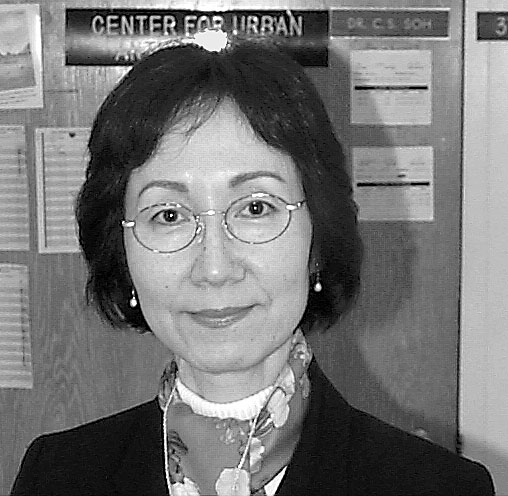

 |
 |
 |
Return to top
The recipient of a MacArthur Foundation Research and Writing Grant, Chunghee Sarah Soh, associate professor of anthropology, lived in Japan during her adolescence because of her father's work with the Korean diplomatic corps. Of that time she says, "As a young Korean girl I was fascinated by the way the Japanese people behaved differently from what I was used to." Soh was especially surprised to learn that the Japanese la nguage maintains a noticeable gender difference between male and female speech. Although not conscious of it at the time, Soh was engaging in the kind of cultural anthropology that she now makes her life's work.
After completing her freshmen year with honors in English Language and Literature at Ewha Women's University in South Korea, Soh moved with her family when her father's work took him to London, England. While waiting for admission to a university, Soh enrolled in a commercial college, studying English and earning certificates in typing and shorthand. Meanwhile, her father had been promoted and was leaving London early for a post in the Philippines. Soh stayed on to finish her course work. While at the Philippines embassy to get her visa so she could join her family, Soh was greatly impressed to find that the consul was a woman. She had never seen a woman in that official position in Korea. This sparked an interest in gender and politics, an interest that would later inform her graduate study.
But first she returned to Korea and finished her undergraduate degree summa cum laude in English Language and Literature at Sogang University. Her plan was to go on with her schooling. "My dream had always been to be a university professor," Soh recalls, but even though she was the eldest child, she was also a daughter, and her parents could not afford to support both her and her brother's desires for advanced education. After working in the business world for close to a decade, Soh obtained a grant from the East-West Center and began graduate study in anthropology at the University of Hawaii. Reflecting the interests in gender and politics she had developed, Soh's dissertation, which she later turned into two books, w as a study of "Women in Korean Politics" (Soh 1993).
In what she calls a "felicitous occasion," Soh came to San Francisco State in 1994. She had been looking for the next step in her career, when an opening in the anthropology department appeared. While she is pleased that the diverse student population at SFSU provides many students who are interested, like she is, in cross-cultural study, Soh finds it even more important that students here "are a lot more open in expressing themselves." She says, "I find it very refreshing--I always have good class discussions."
With her experience living in Japan and the Philippines and her native Korean and fluent Japanese, Soh is perfectly positioned to do the research she is currently working on--the "comfort women" who, during WWII, were used by the Japanese army to satisfy the sexual desires of its soldiers. These women came predominantly from colonial Korea and occupied territories such as China, the Philippines, and Indonesia (where both Dutch women and native Indonesians were forced to become "comfort women").
Soh explains, "There are two important components to my research: historical reconstruction, trying to understand what really happened, and a study of the contemporary redress movement for gross violations of women's human rights that started in Korea but has become transnational." Soh's research has included meeting all the major players in the redress movement--survivors, feminist and human rights activists, and government officials--during ethnographic field research in Korea, Japan, and the Netherlands. She has published several articles on her research, and has presented papers at professional conferences and given invited lectures across the nation and abroad.
She acknowledges that her research deals with a very complicated and grim issue, but she is "pleased and very grateful" that a MacArthur Foundation grant will "allow [her] time to analyze the huge piles of field-work data and to write a book."
--William Morris
Return to December First Monday
Return to First Monday Archive
SFSU, 1600 Holloway Avenue, San Francisco, CA 94132
Last modified December 3, 1999, by Webmaster & Co.